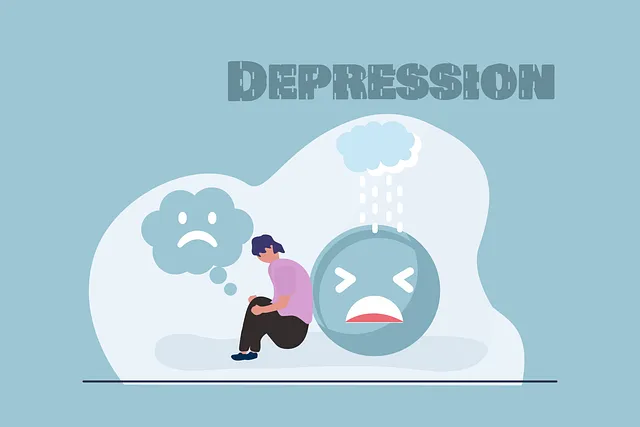Burnout among healthcare providers in Northglenn, where Kaiser Permanente offers extensive mental health coverage, is a significant concern impacting patient care quality. High workload demands and undervalued mental health contribute to emotional exhaustion, depersonalization, and reduced personal accomplishment. Access to resources like Kaiser's coverage and wellness programs, including mindfulness practices, EI training, CBT, and relaxation exercises, mitigates burnout. Prioritizing self-care and seeking support also help maintain a healthy work-life balance. Organizations like Kaiser Permanente Northglenn are leading the way in preventing provider burnout through comprehensive mental health coverage and initiatives fostering open communication and improved job satisfaction.
Healthcare provider burnout is a growing concern, impacting patient care and organizational success. This article explores comprehensive strategies to prevent burnout among healthcare professionals, focusing on both individual and organizational levels. We delve into the causes and effects of this widespread issue, highlighting the significance of mental health support, as illustrated by Kaiser Permanente’s innovative approach in Northglenn. Additionally, we present evidence-based tactics for clinical settings and emphasize the critical roles of self-care and work-life balance.
- Understanding Burnout Among Healthcare Providers: Causes and Impact
- Kaiser Permanente's Approach to Mental Health Coverage in Northglenn
- Evidence-Based Strategies for Preventing Burnout in Clinical Settings
- The Role of Self-Care and Work-Life Balance in Healthcare Professional Wellbeing
- Building Resilient Teams: Organizational Support for Burnout Prevention
Understanding Burnout Among Healthcare Providers: Causes and Impact

Burnout among healthcare providers is a growing concern, impacting not only individuals but also the quality of patient care. It’s essential to recognize that this phenomenon extends beyond mere job dissatisfaction; it involves emotional exhaustion, depersonalization, and reduced personal accomplishment, as defined by the World Health Organization (WHO). The causes are multifaceted, often stemming from high workload demands, lack of control over work processes, insufficient rewards, and a culture that undervalues mental health.
For healthcare professionals in locations like Northglenn, where Kaiser Permanente offers comprehensive mental health coverage, understanding burnout becomes even more critical. This is because access to resources can mitigate risk factors. However, the impact extends beyond individual suffering; it affects patient outcomes and the overall resilience of the healthcare system. Public Awareness Campaigns focused on Mental Wellness and Mental Illness Stigma Reduction Efforts play a crucial role in addressing this issue by fostering a supportive environment, encouraging open conversations about mental health, and promoting strategies to prevent and manage burnout.
Kaiser Permanente's Approach to Mental Health Coverage in Northglenn

In Northglenn, Kaiser Permanente has implemented a comprehensive approach to mental health coverage, recognizing its crucial role in overall healthcare. They prioritize mental wellness by offering diverse services tailored to meet the unique needs of their community. This includes accessible counseling sessions, psychological evaluations, and programs focused on inner strength development. By integrating these initiatives, Kaiser Permanente aims to reduce burnout among healthcare providers while fostering a supportive environment that promotes mental resilience.
The organization’s commitment extends to providing healthcare provider cultural competency training, ensuring staff are equipped to address the diverse mental health needs of their patient population. This strategic approach not only enhances the quality of care but also contributes to a more fulfilling and sustainable work environment for healthcare professionals in Northglenn.
Evidence-Based Strategies for Preventing Burnout in Clinical Settings

In clinical settings, evidence-based strategies are paramount for preventing burnout among healthcare providers. Organizations like Kaiser Permanente Northglenn recognize the importance of comprehensive wellness programs that encompass mental health coverage and support services. One such strategy is integrating mindfulness practices into daily routines, which has shown promise in reducing stress levels and enhancing emotional resilience. Additionally, promoting Self-Esteem Improvement through regular supervision, coaching, and peer mentoring can significantly mitigate burnout risks by fostering a supportive professional environment.
Emotional Intelligence (EI) training is another effective approach. By teaching healthcare providers to recognize and manage their emotions, as well as understand those of their patients, EI enhances interpersonal connections and job satisfaction. Anxiety Relief techniques, such as cognitive-behavioral therapy (CBT) and relaxation exercises, are also valuable tools for managing workplace stress. Together, these evidence-based strategies create a more balanced and fulfilling work environment, ultimately reducing burnout rates among healthcare professionals.
The Role of Self-Care and Work-Life Balance in Healthcare Professional Wellbeing

Maintaining a healthy work-life balance is an essential aspect of burnout prevention strategies for healthcare providers. The demanding nature of the medical field can often lead to long hours and high-stress environments, impacting professionals’ mental health and overall wellbeing. Therefore, prioritizing self-care becomes crucial. Healthcare workers in Northglenn, like those covered by Kaiser Permanente mental health coverage, should recognize the importance of setting boundaries between work and personal life. This includes ensuring adequate rest, engaging in regular physical activity, and cultivating hobbies or activities that bring joy and relaxation.
Risk Management Planning for Mental Health Professionals can involve integrating these self-care practices into daily routines. By recognizing the signs of burnout and implementing strategies to promote mental resilience, healthcare providers can enhance their ability to cope with work-related stress. Additionally, seeking support from colleagues, mentorship programs, or professional counseling services specifically tailored for mental health professionals can significantly contribute to maintaining a healthy balance. This proactive approach will not only prevent burnout but also improve the overall quality of care provided to patients.
Building Resilient Teams: Organizational Support for Burnout Prevention

In today’s fast-paced healthcare environment, building resilient teams is a game-changer in preventing provider burnout. Organizations like Kaiser Permanente Northglenn recognize the importance of fostering a supportive culture that prioritizes mental health coverage and overall well-being. By implementing strategies to enhance team resilience, such as social skills training and empathy-building exercises, healthcare providers can navigate the challenges of their roles more effectively. These initiatives create an environment where open communication and mutual support become the norm, leading to improved job satisfaction and reduced burnout rates.
The key lies in organizational support that goes beyond basic compensation and benefits. Kaiser Permanente Northglenn’s commitment to Depression Prevention programs, for instance, demonstrates a proactive approach. Through regular workshops and training sessions focused on empathy building strategies, healthcare providers learn to connect on a deeper level with patients, reducing the emotional toll of their work. Such initiatives not only prevent burnout but also enhance patient care by fostering stronger relationships based on understanding and compassion.
Healthcare provider burnout is a pressing issue, but with the right strategies, it can be mitigated. By understanding the causes and impact of burnout, organizations like Kaiser Permanente in Northglenn have implemented effective solutions, such as enhanced mental health coverage, evidence-based practices, and promotion of self-care. Additionally, fostering work-life balance and building resilient teams supported by organizational initiatives are key to preventing burnout. Integrating these strategies can create a healthier, more sustainable environment for healthcare professionals, ensuring they can provide the best care possible for their patients.






